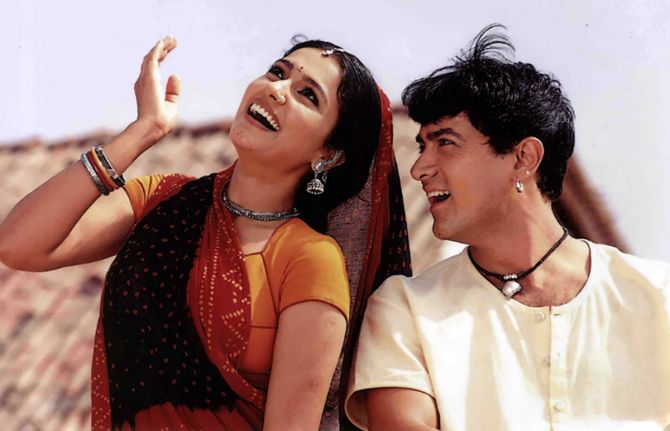On Lagaan's 20th anniversary, we bring back Aamir Khan's views expressed in an exclusive interview to Rediff.com Contributor Haresh Pandya in February 2000.

If we were playing a word game, Kanuria and Bhuj would immediately be followed by Aamir Khan.
Dhoti, waistcoat, turban, earnings, Aamir looks the typical Indian farmer.
But he was his usual impressive and lively self while giving Haresh Pandya* an exclusive interview on the sets of Lagaan in February 2000, which also happens to be the versatile actor's first film as a producer. It also happens to be a film where he is the protagonist.
What made you produce this film?
When I first heard Lagaan's script, I was very excited.
I felt I should produce it myself.
It's quite an expensive film, but I felt the creative team should have full liberty to make the film well.
Similarly, the production manager should have full faith in the creative team.
Since I had faith in Ashutosh (Gowariker), the director, I decided to produce Lagaan myself.
What is so special about Lagaan?
As far as I am concerned, it is the story and the script that I like most about Lagaan.
Could you elaborate on the story and the script?
Well, the story is placed in the 1890s, during the period of the British Raj. But it is not a true story nor is it based on the freedom movement.
The drought-hit villagers are not in a position to pay the lagaan (tax).
The officer in charge of collecting it does not listen to their pleas.
In fact, his shenanigans put the villagers in trouble.
The officer orders them to pay the lagaan of two years together. Then, to please his warped sense of humour as it were, he lays a difficult condition before them.
If the villagers fulfill the condition, he will excuse them and they will not have to pay anything.
But if they fail, they would have to pay a fine in addition to the lagaan.
A young villager takes up the gauntlet of fulfilling the officer's condition. For obvious reasons, I will not disclose the condition.
But I will say this -- the condition is a very severe one.
Interestingly, this English officer's sister is sympathetic towards the villagers. Even his superiors feel the officer is being a bit too stringent towards the village.

Maybe you could have shown the same situation without taking recourse to the Raj.
No. All I can say is, you will realise why the time frame is necessary only after seeing Lagaan.
You are cast in the role of the protagonist in Lagaan. Did this happen because you are the producer?
Actually, when Ashutosh narrated the story, he had me in mind for the role.
I mean, he wanted me to play the lead.
It was to Aamir Khan, the actor, that he had narrated the story and not vice versa.
He had approached me as an actor to begin with.
I heard the script, I liked it and I was keen to do the film as an actor.
And, since I was so interested, so excited about the script, I told him I would like to produce it myself. That's how it happened.
Your character demands that you wear a dhoti for the duration of the film. Are you comfortable in this attire?
Oh, yes, I am very comfortable in a dhoti.
This is the first time in my film career that I am wearing one.
Not just that, I have even got my ears pierced so that I could actually wear earrings.

The role of a villager, or rather village farmer, has been performed to a nicety in the past by actors like Balraj Sahni, Raaj Kumar, Rajendra Kumar, Sunil Dutt and Manoj Kumar to name but a few.
Do you think you will do justice to the character you are playing in Lagaan?
Why not? A true actor can play any role.
Of course, my role in Lagaan is quite different from the ones played by all the stalwarts you just mentioned.
My character in this film is that of a villager who is simple, but who knows how to fight for his rights.
He is a villager living in the India of the 1890s, mind you.
What difference do you see between Balraj Sahni of Do Bigha Zameen and Aamir Khan of Lagaan?
Quite honestly, I haven't seen Do Bigha Zameen, so I can't really comment on that.
But now that you have mentioned his name, I would like to say Balraj Sahni is one of my all-time favourite actors.
I think he is one of the finest actors, one of the best actors to be ever seen on the Indian screen.
I am a big fan of Balraj Sahni.
Even if I can do just 10 per cent of the kind of acting he used to do, it will be an achievement.

Why did you decide to base Lagaan in Kutch?
I know Bhuj in particular is a border area. My film has nothing to do with a border area.
Actually, we needed a slightly dry location because, as per the script, it has not rained in the village for some years. And it is an agricultural village. Bhuj has got that dry look.
Plus, I was looking for the ideal place to tell this tale, which is based in the 1890s when there was no electricity, no telephone poles, no vehicles.
My film talks about a drought-affected village of that particular era.
It seems that Kutch, today, is faced with the same sort of problem. So, in a way, I am expressing the feelings of the drought-hit people of Kutch as well.
Of course, unlike the Raj, today's government is our own. I believe the villagers today do not have to face the kind of trouble that was inflicted on them by the English in those days. But when the rain is delayed, I think the farmer faces more or less the same problems.
Why did you select Gracy Singh as your co-star?
Well, a lot of girls were screen-tested for the role.
I think Ashutosh must have screen-tested about 50 girls. He feels Gracy suits the role the most, she suits the character the most.
He found her to be both a very good actress and a very good dancer. That's why he cast her.
Are you happy with her performance so far?
Very happy. I think we have done about a month's shooting now and we are very happy and satisfied with her performance.
In fact, she reminds me of Vyjayantimala during her earlier phase.

If Lagaan had been made three decades ago, which actress, in your opinion, would have suited the role?
Vyjayantimala.
Considering your status and star value, you could easily opted for an important heroine instead of an inexperienced Gracy. Did you not feel like going against the wishes of your director?
No, it's not like that.
How can I be sure that no big heroine would say no to me?
Many top heroines had offered to work in this film, though but I was looking for a heroine befitting the script.
Plus, I want to do this film as early as possible, so that I could focus my all attention on it without bothering about anything else. I did not want any disturbance or gaps in shooting.
Among other things, the good thing about Gracy right now is that she is in a position to give all her time to Lagaan and get totally involved in the making of the film. Once you see the completed film, you will agree that it was not a mistake to sign her.
Most of the characters in Lagaan speak a language that is not Hindi. Why is that?
Well, the language we are using in this film is Avadhi.
To tell you the truth, though, it is not strictly Avadhi. It's a diluted form of the language because pure Avadhi may not be understood by many people throughout the country.
Plus, I think it gives the feel of the language spoken by the villagers in this part of the country about a hundred years ago.
Even I am not familiar with the language.
But Avadhi is very similar to khadi boli, which is the normal Hindustani that we speak.
Yet, because there are very few differences between Avadhi and khadi boli, it is difficult to stick to one particular language.
I instinctively tend to lapse into khadi boli even when I am supposed to be speaking in Avadhi simply because I know the meanings of the lines.
So, while talking in Avadhi, I tend to go into khadi boli.
For example, if I have to say Poore ganv mein... Now, in Hindi, I would say Poore ganv mein...
In Avadhi too, it is almost the same.
The only difference is, in Hindi we say mein and in Avadhi it is ma.
While speaking fast, I start saying mein because I have spoken Hindi all my life.
What I am actually supposed to say is ma. So this language thing is there.
Besides, I'm playing quite a challenging role in Lagaan.

You have also taken many local people as junior artistes in Lagaan .You have been working with them for about a month now. What made you take this decision? How are they to work with?
I could have brought junior artistes with me from Bombay. But I had already decided that, as far as possible, I would give opportunities to the local people.
I must say I am quite happy with their work.
Usually, new artistes have problems when facing the camera for the first time.
But these local artistes are quite different. They are not only talented; they are also very co-operative and have been working in the film with complete dedication.
In fact, the whole set of the village has been made possible only because of their help.
They have understood the script well and they have no problem whatsoever in playing the roles assigned to them.
What is the difference between acting in one's own film and acting in somebody else's film? Do you have to put in more effort when you are a producer as well as an actor?
The effort always has to be 100 per cent, whether one works in one's own film or in somebody else's. I don't think I would have put in less of an effort in Lagaan if someone else had been the producer.
In the last 10 years, I have worked in so many different films and with so many different producers and directors.
I think my effort has always been 100 per cent. I have never held back in my effort.
But in terms of complete control...
Yes, I certainly have more control in Lagaan.
I can offer a lot more facilities because I am part of the creative team. It is easier for Ashutosh to explain what he wants to me.
I will give you an example.
If the director tells the producer that he wants 50 camels, the latter will normally will think of the costs first.
He will probably say, "Why not 25? Can't you manage with 25 camels?"
Whereas, if he is telling me the same thing -- the director asking the producer to provide 50 camels, that is -- I will not waste time asking him questions because I am also creatively aware why he needs them.
Even I will want him to have that creative freedom -- to shoot a scene the way he wants it. The visual should come through the way he wants it.
Why was Bhanu Athaiya designated Lagaan's costume designer?
Well, the costumes of this film are very important because it is a period film -- the story goes back 100 years, so you need somebody who has a great knowledge of the period, of 100 years ago, that is.
Bhanuji is, to begin with, a very good designer.
Plus, she is one person who has a lot of knowledge about different periods.
As you know, she has also won the Oscar for the film, Gandhi. She was the ideal choice for our film.
Do you think the new generation cinegoers, reared as they are on the Internet, will accept a film based in 19th century India?
Yes, I think so. I don't believe that the audience decides in advance whether or not they will watch a period film or something like that.
If that was the case, then Mughal-e-Azam would never have done well because it was set in the 15th century.
If a film is made well, cinegoers are not concerned with the period or the era it is set in.
Even today, if you make film on a contemporary subject, it may still not do well. Even films made on the events of 1999 or 2000 do not guarantee any success.
The main thing is that the film has to be good, period or not.
The story is important, the script is important. And the execution of the film is very important.
<p
Do you believe in the number games? Do you strive to be number one?
I would just like to be the most loved and respected actor in the country.
If you call this the number game, well, then I believe in it!
As a film person, to what extent have you been influenced by your father?
I've been very much influenced by him.
I have grown up with him.
I have learnt a lot of good qualities from him.
I always admired his straightforwardness, his honesty and the way he dealt with people.
He is a man of his word and a man of honour.
I have learnt all these things from him.
How do you look back on your career, now that you have completed 10 years in Bollywood?
I think it has been a good learning experience.
I am quite happy with the kind of response that the audience has given my work, my films.
In fact, I would like to take this opportunity to thank them for the love and respect they have shown for me all these years.
What is it that frustrates or irritates you about the Hindi film industry?
Indiscipline. Indiscipline of any kind and in any way.
Do you prefer to act in films like 1947: Earth?
Every film has its own charm.
It's not that I prefer an off-beat film to a regular commercial film.
If a film is good, whether it is off-beat or a regular commercial one, it will do well.
How do you view the awards system in Bollywood?
I don't believe in awards. I find there is a lot of inconsistency in the kind of awards programmes that are organised in our country.
I prefer not to associate myself with them.
What is your strength as an actor?
My strength as an actor is that I know my weaknesses!
There are a lot of areas in which I can still improve as an actor.
How would you rate yourself in the highly competitive world of Bollywood?
As far as signing more and more films are concerned, I am not in competition at all. I sign very few and very select films. Of course, if the competition is limited just to good acting, there is no going back.
And let me tell you, it is a blatant lie if you have heard that I charge Rs 20 million to Rs 30 million to work in a film. These are rumours only.
I never like to talk and work in terms of statistics, but I must say I am perfectly happy and satisfied with whatever I get in terms of money.
Is there any particular film for which you had high hopes, but which bombed at the box office?
Yes, Akele Hum Akele Tum, in which my co-star was Manisha Koirala. Although it wasn't a complete flop, it didn't do as well as it was expected to.
And would you believe it, I got so nervous at its failure that, once, I literally cried?
Manisha, too, had worked hard for that film.
Of course, this is not just with me.
Any artiste is disappointed when his or her film does not produce the desired results.
This interview was first published on Rediff.com in February 2000.
*Sadly, Haresh Pandya passed away in an accident in November 2017. You can read Cheteshwar Pujara's tribute to Mr Pandya here.












 © 2025
© 2025